Kechao Cai
Merit-based Fair Combinatorial Semi-Bandit with Unrestricted Feedback Delays
Jul 29, 2024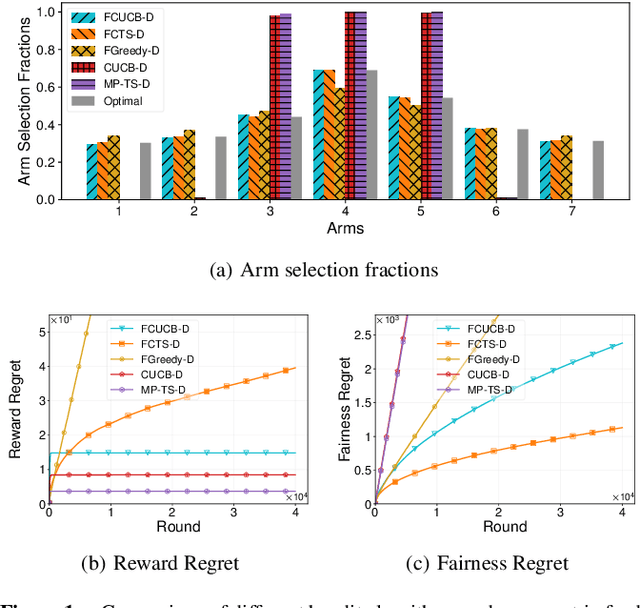
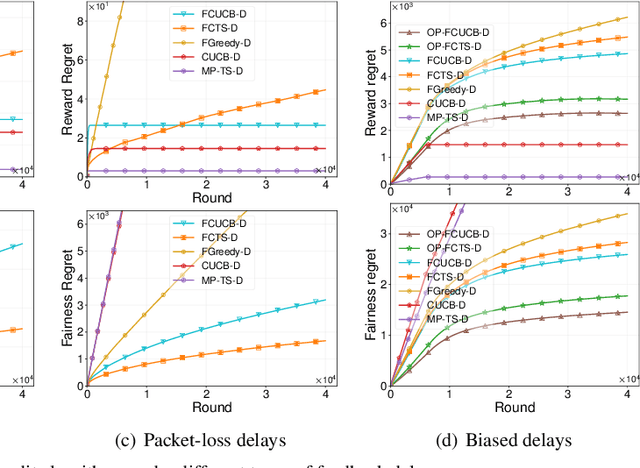
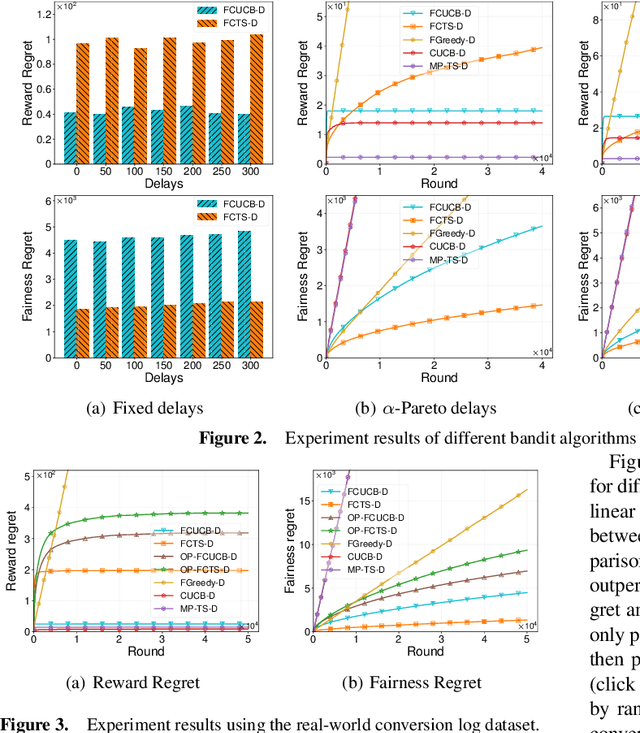
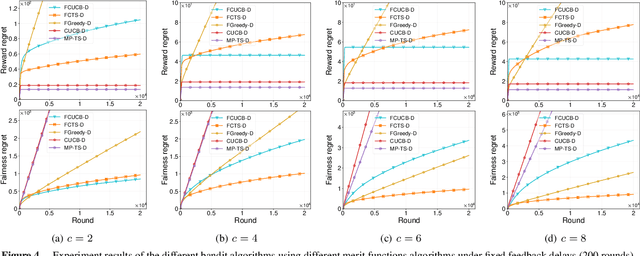
Abstract:We study the stochastic combinatorial semi-bandit problem with unrestricted feedback delays under merit-based fairness constraints. This is motivated by applications such as crowdsourcing, and online advertising, where immediate feedback is not immediately available and fairness among different choices (or arms) is crucial. We consider two types of unrestricted feedback delays: reward-independent delays where the feedback delays are independent of the rewards, and reward-dependent delays where the feedback delays are correlated with the rewards. Furthermore, we introduce merit-based fairness constraints to ensure a fair selection of the arms. We define the reward regret and the fairness regret and present new bandit algorithms to select arms under unrestricted feedback delays based on their merits. We prove that our algorithms all achieve sublinear expected reward regret and expected fairness regret, with a dependence on the quantiles of the delay distribution. We also conduct extensive experiments using synthetic and real-world data and show that our algorithms can fairly select arms with different feedback delays.
GeNet: A Graph Neural Network-based Anti-noise Task-Oriented Semantic Communication Paradigm
Mar 27, 2024



Abstract:Traditional approaches to semantic communication tasks rely on the knowledge of the signal-to-noise ratio (SNR) to mitigate channel noise. However, these methods necessitate training under specific SNR conditions, entailing considerable time and computational resources. In this paper, we propose GeNet, a Graph Neural Network (GNN)-based paradigm for semantic communication aimed at combating noise, thereby facilitating Task-Oriented Communication (TOC). We propose a novel approach where we first transform the input data image into graph structures. Then we leverage a GNN-based encoder to extract semantic information from the source data. This extracted semantic information is then transmitted through the channel. At the receiver's end, a GNN-based decoder is utilized to reconstruct the relevant semantic information from the source data for TOC. Through experimental evaluation, we show GeNet's effectiveness in anti-noise TOC while decoupling the SNR dependency. We further evaluate GeNet's performance by varying the number of nodes, revealing its versatility as a new paradigm for semantic communication. Additionally, we show GeNet's robustness to geometric transformations by testing it with different rotation angles, without resorting to data augmentation.
Fair Distributed Cooperative Bandit Learning on Networks for Intelligent Internet of Things Systems (Technical Report)
Mar 18, 2024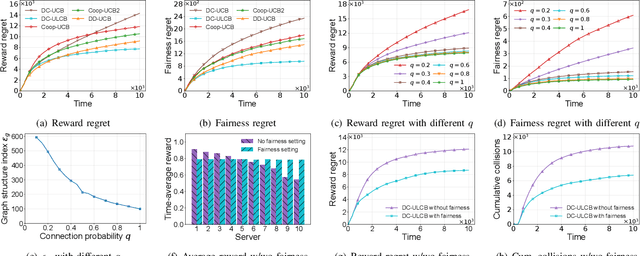
Abstract:In intelligent Internet of Things (IoT) systems, edge servers within a network exchange information with their neighbors and collect data from sensors to complete delivered tasks. In this paper, we propose a multiplayer multi-armed bandit model for intelligent IoT systems to facilitate data collection and incorporate fairness considerations. In our model, we establish an effective communication protocol that helps servers cooperate with their neighbors. Then we design a distributed cooperative bandit algorithm, DC-ULCB, enabling servers to collaboratively select sensors to maximize data rates while maintaining fairness in their choices. We conduct an analysis of the reward regret and fairness regret of DC-ULCB, and prove that both regrets have logarithmic instance-dependent upper bounds. Additionally, through extensive simulations, we validate that DC-ULCB outperforms existing algorithms in maximizing reward and ensuring fairness.
Beyond the Click-Through Rate: Web Link Selection with Multi-level Feedback
May 04, 2018


Abstract:The web link selection problem is to select a small subset of web links from a large web link pool, and to place the selected links on a web page that can only accommodate a limited number of links, e.g., advertisements, recommendations, or news feeds. Despite the long concerned click-through rate which reflects the attractiveness of the link itself, the revenue can only be obtained from user actions after clicks, e.g., purchasing after being directed to the product pages by recommendation links. Thus, the web links have an intrinsic \emph{multi-level feedback structure}. With this observation, we consider the context-free web link selection problem, where the objective is to maximize revenue while ensuring that the attractiveness is no less than a preset threshold. The key challenge of the problem is that each link's multi-level feedbacks are stochastic, and unobservable unless the link is selected. We model this problem with a constrained stochastic multi-armed bandit formulation, and design an efficient link selection algorithm, called Constrained Upper Confidence Bound algorithm (\textbf{Con-UCB}), and prove $O(\sqrt{T\ln T})$ bounds on both the regret and the violation of the attractiveness constraint. We conduct extensive experiments on three real-world datasets, and show that \textbf{Con-UCB} outperforms state-of-the-art context-free bandit algorithms concerning the multi-level feedback structure.
Multi-level Feedback Web Links Selection Problem: Learning and Optimization
Sep 08, 2017
Abstract:Selecting the right web links for a website is important because appropriate links not only can provide high attractiveness but can also increase the website's revenue. In this work, we first show that web links have an intrinsic \emph{multi-level feedback structure}. For example, consider a $2$-level feedback web link: the $1$st level feedback provides the Click-Through Rate (CTR) and the $2$nd level feedback provides the potential revenue, which collectively produce the compound $2$-level revenue. We consider the context-free links selection problem of selecting links for a homepage so as to maximize the total compound $2$-level revenue while keeping the total $1$st level feedback above a preset threshold. We further generalize the problem to links with $n~(n\ge2)$-level feedback structure. The key challenge is that the links' multi-level feedback structures are unobservable unless the links are selected on the homepage. To our best knowledge, we are the first to model the links selection problem as a constrained multi-armed bandit problem and design an effective links selection algorithm by learning the links' multi-level structure with provable \emph{sub-linear} regret and violation bounds. We uncover the multi-level feedback structures of web links in two real-world datasets. We also conduct extensive experiments on the datasets to compare our proposed \textbf{LExp} algorithm with two state-of-the-art context-free bandit algorithms and show that \textbf{LExp} algorithm is the most effective in links selection while satisfying the constraint.
 Add to Chrome
Add to Chrome Add to Firefox
Add to Firefox Add to Edge
Add to Edge